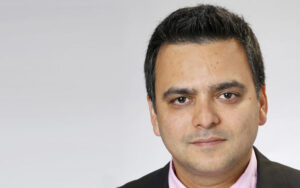It was during the Die Mould India 2016 that I caught up with Hoffmann Executives. In a 30 minute conversation with Martin Reichenecker, Chief Sales Officer, Hoffmann Group and Pinaki Banerjee, MD, Asia Pacific, Hoffmann Quality Tools, Asia Pacific Pte Ltd I spoke to them about their plans for the Indian market, products and strategies. Excerpts…
Tell us something about Hoffmann Group…
Martin Reichenecker: Founded in 1919 in Munich, Germany, Hoffmann Group is active in the metal treating industry. What makes us different is that we provide very high quality consultancy services. Our main motto is to solve the problems of our customers that are related to the tools, thus enhancing their productivity and efficiency.
We are the third largest supplier in Germany and directly competing with the best and biggest in the industry. Additionally, in our portfolio, is a wide range of hand tools and work shop equipment. So we not only help with the tools but also optimize the whole production process by having products that is used in general engineering as well.
This is what we are doing for almost a century …increasing our portfolio, enhancing productivity of our customers and we are very proud to say that we reached the sales of Euro 1.1 billion last year.
We source our products from the leading manufacturers. With 65,000 tools in our catalogue we work with roughly 500 suppliers and manufacturers and most of them are coming from Europe.
Also, with a team of highly skilled people at our headquarters in Munich, we develop tools with our suppliers. We consult with our customers about their demand and changes they want. With that feedback we go to our manufacturers and they help us develop the product according to our customers demand.
What helps you tackle tough competition?
Martin Reichenecker: I would say our highly skilled and qualified people. We invest generously in training our people so that they understand the cutting tool process in detail. We believe we are between manufacturers and distributors as we don’t manufacture directly but we consult our manufacturers about the latest technologies and also try to understand the overall production process of the customers. Our people on the field understand the customer’s requirement and their biggest priority is to solve the customer’s problems not just to sell products.
What per cent of your revenue do you invest in R&D?
Martin Reichenecker: We have product management that consist more than 100 people and they develop the tools together with our suppliers, that’s our R&D. Since we don’t produce directly, we don’t have full equipped R&D setup like manufacturers.
What are the current trends that you see in the cutting tool industry?
Martin Reichenecker: I think information is getting more importance. We have to provide all the data related to the tools and products to our customers so that they can take the right decisions. We are in the cutting tool business and also offer pre-setting machine, quality checking equipment, clamping tools, etc and we have to ensure that we give added value to the customers. Customers should be aware of all the information related to his manufacturing process like which pre-setting machine, tool holders and cutting tools is best suited for them. We are well aware about the industry 4.0 and working towards that.
You said Hoffmann saw Euro 1.1 billion sales last year. How much was the contribution from Asia and India particularly?
Martin Reichenecker: In India? I invite you to ask this question after two years (laughs…. joined by Pinaki Banerjee, and Shashi Menon, Head – Technical Department, Hoffmann Quality Tools India Pvt Ltd).
We started our operations in India on April 1, 2016 so we cannot comment anything about the sales here in India. But we have high hopes and we are certain about the positive business outlook of the country. We opened our office and logistics setup in China around 5 years ago and the growth rate in that market is quite high. We expect the same here in India.
The kind of demand you see in European countries might not be same in India and China or any other developing country as they are cost sensitive. How do you plan to tap such markets?
Pinaki Banerjee: We are very new in India. If you look at Hoffmann’s success around the world, you will see it is because we are much focused and want to know ‘how to walk before how to run’. Our first objective is to understand the Indian market. We started in Pune. It is a very lucrative market with huge machining activities happening in and around the city. So our first major focus is on Maharashtra.

Also, as our business motto, we calculate the Price-Performance-Ratio and focus on customer’s ROI. We sell in 97 countries and are proud to say that we are able to compete in every market. In India too we will need to make some adjustments as we go forward, but that’s the name of the game. We might need some local suppliers, we know duty rates are very high and there are some local manufacturers, so in some cutting tool segment we might not be able to compete, but that’s the challenge and we need to start and solve customer’s requirement.
At this moment what we can promise is that we are going to give them value that they are looking for. We see one thing missing in the Indian market is consolidation, so we are coming here as system partner who can provide most of the customer requirements. We are here to stay and solve your machining challenges.
Don’t you think you are a late entrant in the Indian market?
Pinaki Banerjee: Yes. We admit that we are the last entrant, but better late than never. I also believe that we are in right time. We all know that after Modi government came into power and with the Make in India campaign, the manufacturing industry is getting stronger. This is actually the right time to enter the Indian market with growth in GDP rate. I think no one in the world is experiencing such growth.
We are fortunate that we are entering the market when the business sentiment looks positive, manufacturing is growing and FDIs are coming in. Also, I would like to point out that whenever a multinational enters the Indian market they first enter with dealer network, then a branch office and the third they put in the subsidiary, I want to make it very clear, the way Hoffmann has started in the market by setting up a subsidiary, it is a clear sign that we are serious about this market. We are making a commitment to the market that we are going to be in India for the coming 100 years. That’s a promise we want to make to our Indian customers.
What kind of customers do you cater to?
Martin Reichenecker: We have customers from all industries, from big to small. We say “As long as something is produced or maintained, we can help,” that means five people company to a factory employing 5000 people, we serve them all. This is something we are very proud of.
India is home to all kinds of companies that provides high-end tech to cost effective solutions. How do you plan to compete in such a competitive market?
Pinaki Banerjee: Our focus segment is top segment and middle segment…we are not at all into mass, cheap and poor quality product segment. Also the consolidation that we can offer makes us different from any other player. If you look at the tooling it’s not more than 5% of overall investment but if you go to procurement manager in India the biggest focus for him is that 5%. So our approach, as the system partner, is going to add a lot of benefit by cutting down the number of suppliers he needs to negotiate with. Another new initiative we are going to take in the Indian market is “e-commerce”, so we will be putting all our 65,000 products available on the website where you select the product, check the pricing, integrate with your ERP system and the product is delivered to you in a maximum 2 weeks’ time. We are also known for our excellent logistics services, we deliver almost 60,000 products everyday in Europe.
Coming to e-commerce, is it going to be only through your website or are you looking for tie-ups with the likes of PayTM, Tolexo, etc.
Pinaki Banerjee: We have got two systems in place, as you know that multinationals and big companies have got ERP systems and they are very conscious about it and not anybody can be included in their system. Within our company we have got two software’s developed, one we can integrate within their ERP system and another for SMEs, where we have got web shop based e-commerce platform. It’s all about value additions and efficiency.
Going ahead …
Pinaki Banerjee: As they say, “You must first understand then understood” we are currently in the journey of understanding the Indian market and the best way to do that is by meeting the end customers. We have given clear target to our sales executive that they have to meet 1000 customers in a year. It’s time to roll up our sleeves, get in front of customers, understand the market and add value to Indian manufacturing system.


